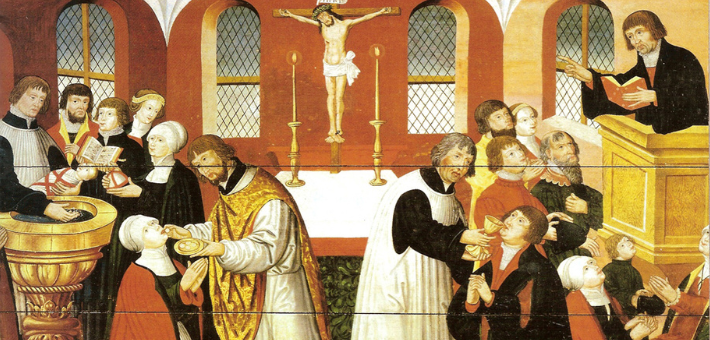Commentary on Romans 3:19-28
Our lectionary reading is part of an answer to the question, “What advantage does the Jew have? Or what is the value of circumcision?” (Romans 3:1). The question is not directed toward “self-righteous Jews,” a misreading ever since the Reformation. We now know Paul’s Jewish contemporaries did not suffer from a collective “works righteousness” but were believers in a divine election founded on God’s faithfulness toward people of the covenant.
The question itself gives it away: Jews had no need to be convinced of the circumcision’s value; it was part of being born, albeit for male members only. Circumcision became an issue only when outsiders criticized it or when newcomers to Judaism paid it undue attention. In Romans 3, Paul answers why he dispenses with requiring circumcision for converts (to Judaism) and whether, in so doing, he abandons the Torah. He concludes this discussion with a resounding affirmation: “We uphold the Torah!” (3:31).
How does Paul reach this conclusion? He deftly shifts the meaning of “Torah” to address two different issues. First, he uses it to mean commandments and precepts by which a particular action can be judged right or wrong (3:19–20). In this case, the Torah’s primary function is to prevent wrongdoing; in highlighting misdeeds, it introduces a “knowledge of sin” (3:20) but does not produce life in itself. Doing “works of the Torah” should therefore be understood as an attempt to use commandments and precepts to earn acceptance into God’s covenant.
Lest we think Paul accuses Jews of “works righteousness,” he insists that the application of the Torah is universal, so that “every mouth is sealed and the whole world is indicted” (3:19). Those “under the Torah” turn out to be both Jews and gentiles! The letter of Romans was, after all, written to address gentile converts to Judaism who thought a fastidious adherence to the Torah would net them benefits.
In addition to a passive function of naming sin, Paul goes on, the Torah has a second, active meaning of bearing witness to the “disclosure” of the righteousness of God (Romans 3:21–22). “The Torah and the Prophets” (3:21) is a shorthand for scripture, following the well-known rabbinic dictum that “the Torah consists of the Torah, Prophets, and Writings,” the threefold division of the Tanakh. Paul stresses the Torah’s divine origins to remind his readers that the Jewish people have been entrusted with “the oracles of God” (Romans 3:2).
If that’s the case, however, how can this righteousness be disclosed now as if for the first time? This inconsistency resolves itself when we remember that Paul is addressing gentile converts, for whom faith represents a new access to God’s righteousness.
What Paul reminds these gentiles about is old news to the covenantal people with whom God forged a relationship, and that relationship is based on faith—that is, the faithfulness of God and the people’s faithfulness to the covenant. Now, God reveals to outsiders this faithfulness—except it is now expressed as Christ’s faithfulness. They are one and the same: The new is the old, since God is one.
The same covenant is established for all, Jews and gentiles alike—“there is no distinction” (3:22)—in the same way that “all have sinned” (3:23). The Reformers were right: It’s all about faith! Not, however, our personal trust in a higher power or a particular belief system, but God’s faithfulness in safeguarding the integrity of the covenant and in making it available for erstwhile rebels against God, those “without the Torah” (3:21).
Faith depends, first and foremost, on God’s initiative, for it is freely given (Romans 3:24–25). Not only “are we made right by [God’s] grace as a free gift” (3:24)—the redundancy is intentional—but outsiders can gain access to a covenant that had excluded them because of “redemption” (3:24). The term apolytrōsis has been subject to much dogmatic contortion, but Paul’s gentile audience would immediately recognize it as payment for deliverance from captivity or slavery. Paul spells out its exact referent in 3:24–25a by presenting Jesus’ death as cleansing the “mercy seat” (hilastērion, 3:25a) in order to allow full access for all to the temple.
Sacrificial language is a rarity in the undisputed letters of Paul, which is why there is growing consensus that these lines were borrowed from the theological sketch of the early Jesus movement. In the temple cult, a priest must cleanse the mercy seat before proper sacrifice for people’s sins, commonly in the form of a burned offering, could proceed. Paul made these words his own by adding “through faith” (3:25; New Revised Standard Version “effective through faith”), to single out the common thread tying the ancient covenant that was established and maintained by God’s unfailing faithfulness to the current rendition that is based on the same faithfulness, now instantiated by the sacrifice of Christ Jesus on the cross.
This new expression of faithfulness results in the covenant being made accessible to gentiles (Romans 3:25b–26). “Former sins” (3:25b) are those committed by gentiles when they had no access to the covenant and no recourse for remission. Now, “in the present season” (3:26), with the cleansing of the mercy seat, God’s righteousness is disclosed.
Make no mistake: God takes the initiative in reconciling erstwhile rebels to God’s self, out of divine faithfulness, by overlooking their previous sins. Atonement is conciliatory and epochal: “While we were enemies, we were reconciled to God through the death of his Son” (Romans 5:10; full discussion of reconciliation at the cosmic level is found in 2 Corinthians 5:18, 21). With this decisive act, the true nature of the Torah can reemerge: It has never been about performance (“works”); it has always centered on faith (“Torah of faith,” 3:27).
What is God’s motive for reconciling with the enemies? Paul presents a tautology: for the purpose of providing “proof of [God’s] righteousness,” but also for the purpose that God be righteous. Reconciling the world to God’s self, in short, is its own justification.



October 26, 2025